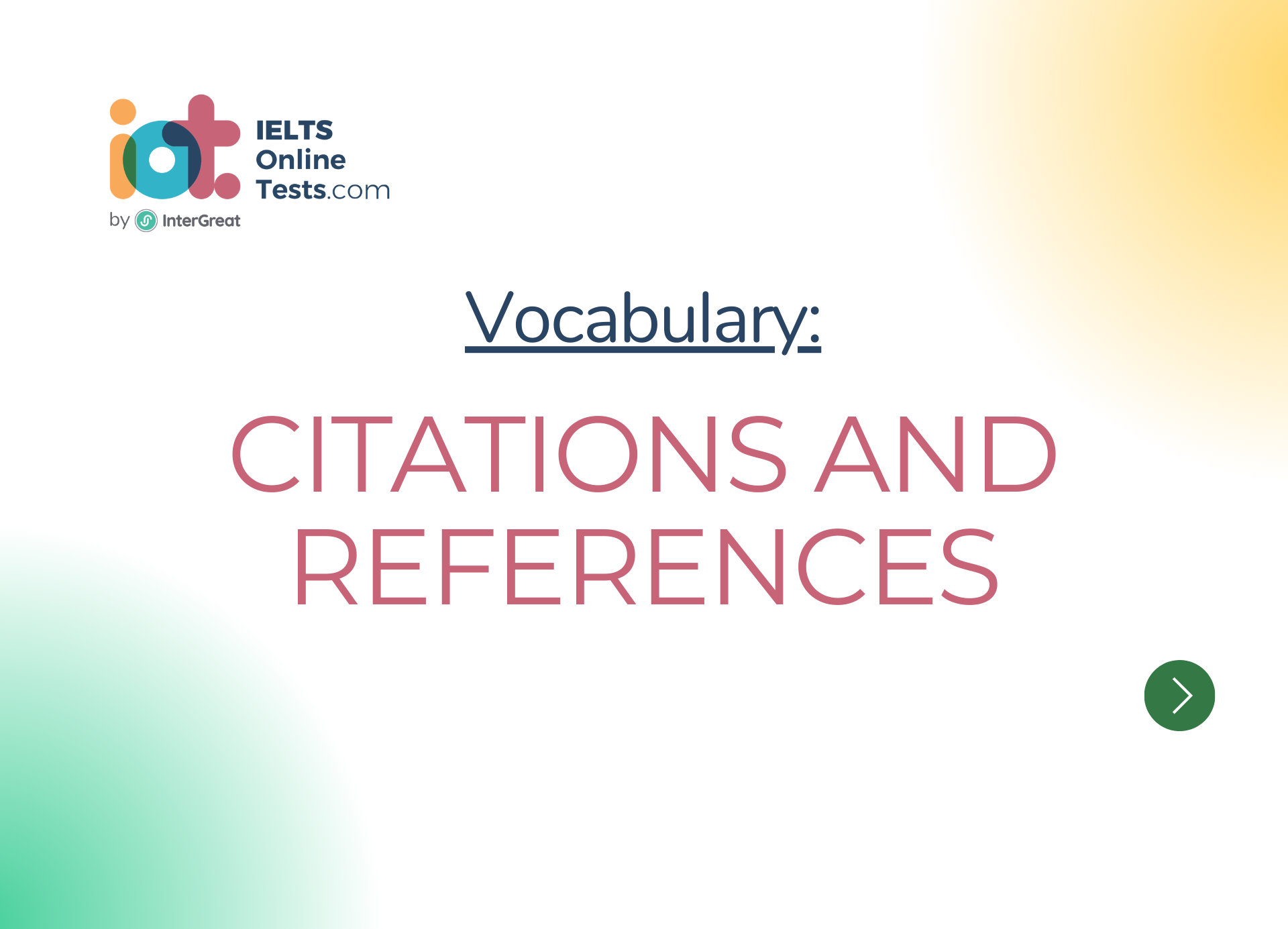
Citations and references
Here are some vocabulary words related to citations and references for the IELTS band score range of 4.5-6.0:
Citation
A reference to the source of information or ideas used in an academic work, such as an essay or research paper.
Reference
Detailed information about the source of information, including the author's name, title, publication date, and other publication details.
Bibliography
A list of all the sources used in a written work, usually placed at the end of the document.
Works Cited
A list of the sources cited in an essay or research paper, placed at the end of the document.
Plagiarism
Using someone else's ideas, words, or work without giving proper credit or permission.
In-text Citation
A brief reference to a source within the text of a written work, typically indicating the author's name and publication year.
Footnote
A note or comment placed at the bottom of the page that provides additional information or cites a source.
Endnote
A note or comment placed at the end of a document, chapter, or section that provides additional information or cites a source.
Paraphrasing
Restating someone else's ideas or information in your own words while maintaining the original meaning.
Quotation
Using someone else's exact words and enclosing them in quotation marks.
Citation Style
A specific format or set of rules for citing sources in academic writing, such as APA, MLA, or Chicago style.
DOI (Digital Object Identifier)
A unique alphanumeric string assigned to identify and provide a permanent link to an online document.
URL (Uniform Resource Locator)
The address that identifies the location of a specific webpage or online resource.
Peer-reviewed
A process in which a scholarly work is evaluated by experts in the same field before publication.
Primary Source
An original source of information or data, such as a firsthand account or original research study.
Secondary Source
A source that interprets or analyzes primary sources, such as a review article or textbook.
Citing the Author
Acknowledging the author of a source in the citation.
Citing the Title
Including the title of the source in the citation.
Citing the Publication Date
Including the publication date of the source in the citation.
Citing the Page Number
Including the page number or page range of the specific information used in the citation.
Citing Electronic Sources
Properly referencing online or digital sources, including websites, articles, and online documents.
Academic Integrity
The ethical practice of giving proper credit to the original sources of information used in academic work.
Parenthetical Citation
A citation placed within parentheses in the text, providing brief details about the source.
Superscript Citation
A citation indicated by a raised number (superscript) in the text, with the full citation listed in a footnote or endnote.
APA Style
A citation style developed by the American Psychological Association, commonly used in the social sciences.
MLA Style
A citation style developed by the Modern Language Association, commonly used in the humanities.
Chicago Style
A citation style developed by the University of Chicago Press, commonly used in history, literature, and the arts.
CSE Style
A citation style developed by the Council of Science Editors, commonly used in the sciences.
Harvard Referencing
A citation style commonly used in various disciplines, requiring the author's name and publication date in the in-text citation.
Author-Date System
A system of in-text citation that includes the author's name and the publication date.
Numeric System
A system of in-text citation that uses numbers to refer to sources, with the full citation listed in footnotes or endnotes.
Plagiarism Checker
An online tool or software that detects and identifies instances of plagiarism in a document.
Citation Manager
Software or applications used to organize and manage citations and references in academic writing.
DOI Resolver
A tool that resolves and provides access to full-text documents using their DOIs.
Retrieval Date
The date on which an online source was accessed or retrieved.
Citation Generator
An online tool that automatically generates citations based on input information.
Indentation
The practice of setting off the second and subsequent lines of each entry in a bibliography or reference list.
Alphabetical Order
Arranging sources in a bibliography or reference list in alphabetical order according to the author's last name.
Remember to use the appropriate citation style specified by your academic institution or instructor when citing sources in your writing. Accurate and consistent citations and references are essential for maintaining academic integrity and supporting the credibility of your work. Good luck with your studies!




